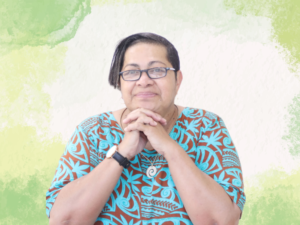Kaselehlie maing ko, Mogethin, Ran annim, Lenwo,
KAMORALE!
As we launch our new Strategic Plan 2025-2030, we pay our respects and gratitude to all those who worked tirelessly so that the College of Micronesia-FSM (COM-FSM or the College) could achieve the goals we set in the last  Strategic Plan.
Strategic Plan.
The Strategic Plan 2025-2030 was developed, designed and published in-house from April 2023-September 2024. Undertaken on the premise that ‘no one knows our College better than we do’, the strategic plan development journey also provided the opportunity for all constituent parts to reflect, assess past performances and create the College roadmap together for the next five years. The experience was instructional especially in relation to qualitative data generated through the SWOT analysis sessions facilitated by the five Vice Presidents across all College departments at the six campuses in all fours States: Yap, Chuuk, Kosrae and Pohnpei.
Input from the State and National Governments was made available mainly through meetings between State and National Government officials and the COM-FSM Board of Regents and the College President. Community input was garnered through direct involvement with the community at the strategic planning summit.
COM-FSM hosted its Strategic Plan Summit on August 20, 2024 at the FSM-China Friendship Center. The Summit was focused on the College’s new draft Strategic Plan 2025-2030. A total of 262 participants took part in the Summit, with 149 joining the Summit in person, while 113 participated in the Summit through Zoom. The College also used an events app called ‘Whova’, as a tool to engage with the Summit participants throughout the day with registration, the agenda, and discussions[1]. The goal of the Summit was to gather feedback from attendees’ responses to focus questions that were based on the three goals of the new Strategic Plan; access, innovation, and resilience. A case study was also designed with focus questions to guide group discussions and the ensuing feedback has been integrated with the Strategic Plan. The Summit Report, compiled after the Summit event is available on the COM-FSM website.
As part of the COM-FSM integrated planning framework, the strategic plan emanates from the mission as the foundational platform and focuses on enhancing learner-centeredness and learner and student support services. Effectively, this approach integrates learning and teaching as THE core business with essential support services provided by the non-faculty sections of the College in the continuous cycle of improvement and best practices. Performance for all College entities is determined by each Actionable Implementation Plan (ACIP) which derives directly from the strategic plan and will align with each employee’s work plan.
The Covid-19 pandemic (2020-2022) as the most significant single, global event that prefaced the development of this plan necessitated the unprecedented and immediate implementation of strategies and practices for learning and teaching and support services to ensure minimal interruptions to the delivery of classes across the six campuses. Education-driven technology particularly CANVAS[2] as the Learning Management System and Zoom[3] provided the online platforms through which learning materials, assessments, course information and classes were disseminated. Never before had educators been required to adapt to immediate change at the speed demanded by the pandemic. After the pandemic, the learning and teaching landscape remained forever changed as COM-FSM continued to build on the transformative power of education-driven technology to increase access to education across over 1 million square miles of ocean.
Acknowledging that the Federated States of Micronesia (FSM) is a Large Ocean-Small Islands State necessitates a reframing of the formal education system which is inherited from the United States which is a part of a continent or significant land mass. While the need for land-based professions and occupations has long been recognized, the largely untapped potential of the ‘blue Pacific continent’[4] that surrounds us remains unexplored. As traditional seafarers, our history is steeped in voyaging stories. Our oral traditions traverse both land and seascapes with equal significance. As modern Pacific Islanders, we have become increasingly land-bound with our gaze often characterized more by limitations than opportunity. Our ocean as it has since time immemorial, nurtures sustaining and multiple resources. As the only national College of the FSM, a part of our responsibility as educators is to identify and explore new opportunities and champion change in education. Marine research and development at COM-FSM are two such areas which require renewed and considerable attention. We will continue working with our partners, especially our sister colleges, and the Land and Sea Grant programs to create new courses, programs and research projects that expand our reach. Furthermore, we will also establish and develop new partnerships for innovative marine science initiatives.
The success of the Strategic Plan 2025-2030 will depend predominantly on the following factors:
- Individual commitment and institutional performance;
- Agility and innovative responses to change and resource-creation;
- Ability to engage in collaborative partnerships in alignment with the COM-FSM mission;
- Developing and strengthening human resources and effective infrastructure and financial sources; and
- Ensuring continuity through succession planning and creating durable records and archives systems.
Finally, and very importantly, the rich and diverse cultures and languages of the FSM provide a tapestry of both interwoven and distinctive histories of challenges and accomplishments. Central to Micronesian lifestyles and adaptations is cultural identity. These inform, motivate, protect, direct and question those engaged in the social milieu.
For COM-FSM, being self-aware and self-reflective especially through the diverse multi-cultural lens provides the launchpad for the cycle of improvements and best practices in education which are empowered through this strategic plan.
Sincerely,
Theresa Koroivulaono (Ph. D)
President & CEO
College of Micronesia-FSM.


